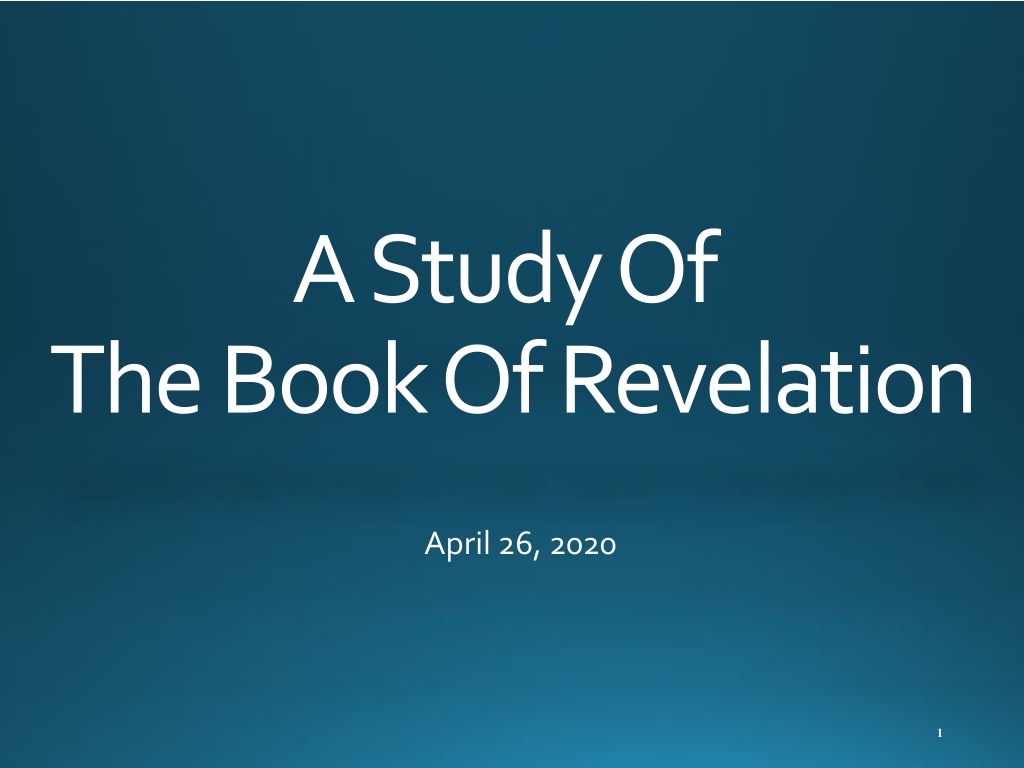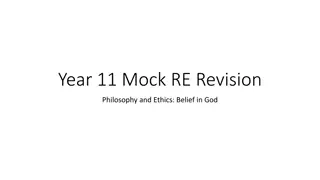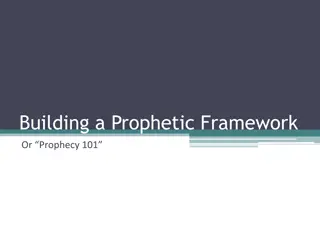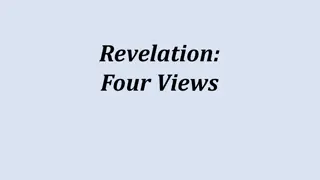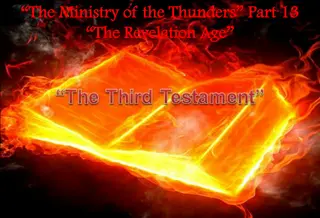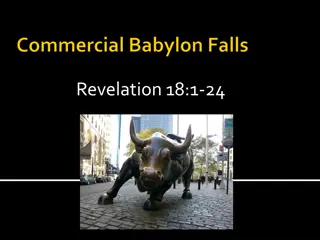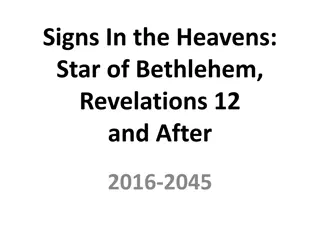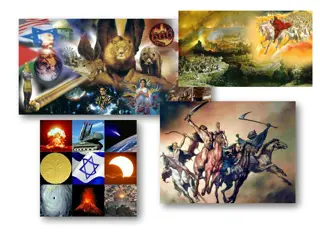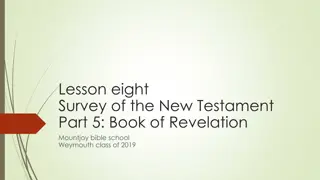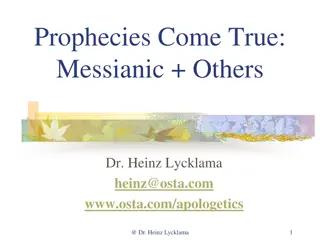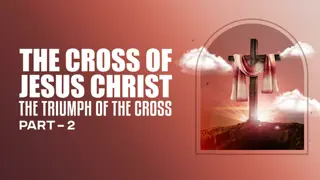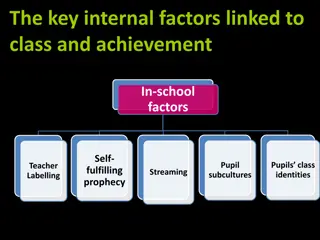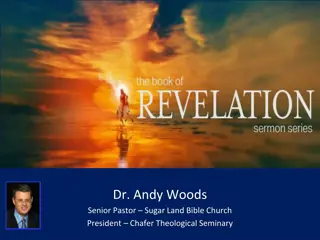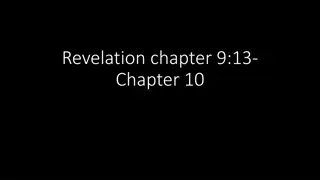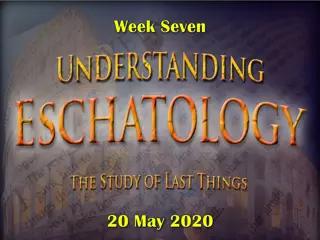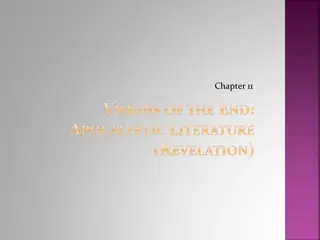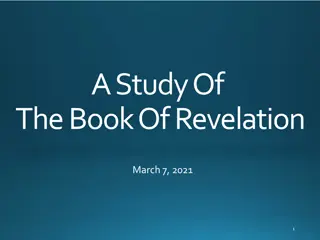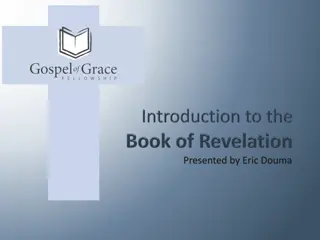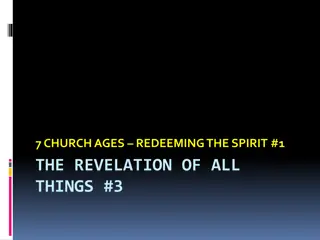Insights into the Book of Revelation: Understanding the Prophecy
Delve into the study of the Book of Revelation through various resources and explore the messages it holds for both the past and the future. Reflect on the significance of the book in the context of its time and consider differing views on its date of authorship, shedding light on the relevance of its prophecies for today.
Download Presentation

Please find below an Image/Link to download the presentation.
The content on the website is provided AS IS for your information and personal use only. It may not be sold, licensed, or shared on other websites without obtaining consent from the author. Download presentation by click this link. If you encounter any issues during the download, it is possible that the publisher has removed the file from their server.
E N D
Presentation Transcript
A Study Of The Book Of Revelation April 26, 2020 1
Resources used: A Study Of The Book Of Revelation by Bob Dodson More Than Conquerors by William Hendriksen Overcoming With The Lamb, Florida College Annual Lectures, February 7-10, 1994 Revelation Introduction and Commentary by Homer Hailey Revelation (Truth Commentaries) by Robert Harkrider Revelation (A Study Workbook) by Robert Harkrider Revelation by Donnie Rader Studies In The Book Of Revelation by Ferrell Jenkins The Old Testament In The Book Of Revelation by Ferrell Jenkins The Revelation Of Saint John The Divine by G.B. Caird The Book of Revelation by Foy E. Wallace The Avenging of the Apostles and Prophets by Arthur M. Ogden Worthy Is The Lamb by Ray Summers Written exchange on THE DOMITIAN PERSECUTION between Arthur M. Ogden and Ferrell Jenkins presented in Searching The Scriptures, June 12, 1989, pages. 7-12 2
Can It Be Understood? Revelation 1:1-3, The Revelation of Jesus Christ, which God gave him to show unto his servants, (even) the things which must shortly come to pass: and he sent and signified (it) by his angel unto his servant John; who bare witness of the word of God, and of the testimony of Jesus Christ, (even) of all things that he saw. Blessed is he that readeth, and they that hear the words of the prophecy, and keep the things that are written therein: for the time is at hand. 3
Can It Be Understood? Revelation 22:6, And he said unto me, These words are faithful and true: and the Lord, the God of the spirits of the prophets, sent his angels to show unto his servants the things which must shortly come to pass. Revelation 22:7, And behold, I come quickly. Blessed is he that keepeth the words of the prophecy of this book. 4
Can It Be Understood? Revelation 22:10, And he saith unto me, Seal not up the words of the prophecy of this book; for the time is at hand. Revelation 22:12, Behold, I come quickly; and my reward is with me, to render to each man according as his work is. Revelation 22:20, He who testifieth these things saith, Yea: I come quickly. Amen: come, Lord Jesus. 5
Can It Be Understood? Some principles we should follow. 1. What did the book mean to the people of that day? 2. That would also raise the question of the date Revelation was written. Early Date: Some defend the date between 60-70 AD. Late Date: The second defended date would be about from 96-98 AD. 6
Can It Be Understood? Some principles we should follow. 3. How shall we understand the book in the light of the Old Testament prophets? There are in Revelation some 400 or more allusions to the Old Testament, but not one single direct quotation. (THERE ARE ONLY 404 verses in the book of Revelation.) 7
Methods of Interpretation FUTURIST METHOD Premillennialism Chapters 1-3 Fulfilled already. Chapters 4-19 as being future. They will be fulfilled just before the Second Coming of the Christ. Chapter 20:1-10 the (millennial reign of Christ on earth) 1000 years and then the loosing of Satan (the millennial ends in failure). Chapter 20:11-15 the judgment, then the final state. This theory is rejected, for it is contradictory to all of the teachings of the Old Testament prophets concerning Christ s reign as King (cf. Daniel 7:13-14; 1 Corinthians 15:24). Christ is not coming to set up a kingdom, rather to deliver the Kingdom to God. 8
Methods of Interpretation CONTINUOUS-HISTORICAL This theory presents the book as a forecast of the body of Christ the church. (Apostasy) rise of the pope (Catholic church), Islam, reformation, and restoration, etc. NOTE: This is not true for if it were true it would have no meaning to the people of the first century who were being persecuted by Rome! How would we know, in regards to Armageddon, which battle in history this would be? This does not fit in harmony with the internal evidence in Revelation at all. 9
Methods of Interpretation PHILOSOPHY OF HISTORY This view says that there are not actual events in Revelation, but rather symbolic forces of good waging war against the forces of evil. In Revelation the spiritual forces conquer the physical forces. The book of Revelation is dealing with an historical situation in which the Christians of John s day were involved. Therefore, we reject this theory of understanding Revelation. 10
Methods of Interpretation PRETERIST This view says the book was written for the people of John s day, and fulfilled in the events of the first century, and has little or no value to us today. This could not be so; else God would not have given it to us by his providence. It is declared by God that all scripture inspired of God is profitable for doctrine, etc. (2 Timothy 3:16-17). Most of Revelation was fulfilled in John s day, but this book has great meaning to us today, especially if we face the persecutions of Satan again as early Christians did in the first and second centuries. 11
Methods of Interpretation HISTORICAL BACKGROUND This view is that the book was written to the people of that particular day and rooted in the history of that time. The Roman emperor was persecuting Christians and therefore Jesus caused this book to be written to manifest to Christians that they would be victorious in Christ Jesus, even if they had to perish with the sword. In this historical background is seen a message for all time. This is, of course, the particular method or theory we will use in our study of Revelation. We do not intend to be dogmatic, but open-minded in our conclusions. 12
Background/Circumstances Severe persecution: (2:10, 13, 22; 3:10) Already under way. Rome felt Christianity to be a threat to the government. Moral conditions (13:3-4) Caesar Worship. 13
Persecution From Authorities Authority of the Jews. (Acts 4:5-6) Court put on trial Whether it is right in the sight of God to hearken unto you rather than unto God, judge ye: for we cannot but speak the things which we saw and heard. (Acts 4:19-20; cf. 1 Peter 4:14-16) Authority of the Jews. (Acts 5:17ff) 1. We must obey God rather than men (Acts 5:29) 2. Note: Acts 5:41-42 3. Stephen stoned. (Acts 7) Authority of the Jews. (Acts 9:1ff) But Saul, yet breathing threatening and slaughter against the disciples of the Lord
Persecution From Authorities Authority of Herod. (Acts 12:1-2) 1. Death of James. 2. Arrest of Peter. Authority of the Magistrates in Philippi. (Acts 16:22ff) 1. Paul and Silas arrested, beaten, and imprisoned. (Acts 16:22ff) 2. Returned to Lydia s house. (Acts 16:35ff)
Warnings About Persecution Luke 21:16-17, But ye shall be delivered up even by parents, and brethren, and kinsfolk, and friends; and (some) of you shall they cause to be put to death. And ye shall be hated of all men for my name's sake. Acts 21:13, Then Paul answered, What do ye, weeping and breaking my heart? for I am ready not to be bound only, but also to die at Jerusalem for the name of the Lord Jesus. Philippians 1:29-30, because to you it hath been granted in the behalf of Christ, not only to believe on him, but also to suffer in his behalf: having the same conflict which ye saw in me, and now hear to be in me. 1 Thessalonians 3:4, For verily, when we were with you, we told you beforehand that we are to suffer affliction; even as it came to pass, and ye know.
Warnings About Persecution 2 Timothy 1:8, Be not ashamed therefore of the testimony of our Lord, nor of me his prisoner: but suffer hardship with the gospel according to the power of God 2 Timothy 3:12, Yea, and all that would live godly in Christ Jesus shall suffer persecution. Luke 22:33-34, And he said unto him, Lord, with thee I am ready to go both to prison and to death. And he said, I tell thee, Peter, the cock shall not crow this day, until thou shalt thrice deny that thou knowest me. 1 Peter 4:16, but if (a man suffer) as a Christian, let him not be ashamed; but let him glorify God in this name. (cf. 1 Peter 2:12)
Caesar Worship When the worship of the Caesars as lord had become the popular state religion, Christians came under suspicion of conspiracy and treason because of their refusal to bow to Lord Caesar. This was one cause of Jesus crucifixion. Matthew 2:2; 27:11, 29, 37, 42; John 19:12; Acts 17:7 Romans knew nothing of the one true God. Caesar worship was not a big problem for most. Some of the Caesars refused it while others accepted it. 18
Caesar Worship To Domitian it was a political question. (Loyalty to Rome) To the Christian it was a religious question. (Loyalty to God) 19
William Barclay: By the time the Revelation was written Caesar worship was the one religion which covered the whole Roman Empire; and it was because of their refusal to conform to its demands that Christians were persecuted and killed. The essence of Caesar worship was that the reigning Roman Emperor, as embodying the spirit of Rome, was divine. Once a year everyone in the Empire had to appear before the magistrates in order to Revelation of John, 1:19-20 20
William Barclay: burn a pinch of incense to the godhead of Caesar, and to say: Caesar is Lord. After he had done that, a man might go away and worship any god or goddess he liked, so long as that worship did not infringe decency and good order; but first of all he must go through the ceremony in which he acknowledged the Emperor as a god. The reason for all this was very simple. Rome had a vast heterogeneous (diverse, mg) empire, stretching from one end of the known Revelation of John, 1:19-20 21
William Barclay: world to another. It had in it many tongues, many races, many traditions, many countries. The problem was how to weld this varied mass into a self-conscious unity. There is no unifying force like the force of a common religion. None of the national religions, and none of the local gods, could conceivably have become universal. But Caesar worship could. It was the one common act and common belief which turned the Empire into a unity. And to refuse to Revelation of John, 1:19-20 22
William Barclay: burn the pinch of incense, and to refuse to say: Caesar is Lord, was not an act of irreligion; it was an act of political disloyalty. If a man refused to go through the annual ceremony, the Romans did not regard him as an irreligious man; they regarded him as a bad and disaffected citizen who refused to acknowledge the greatness of Caesar and the divinity of Rome. That is why the Romans dealt with the utmost severity with the man who would not say: Caesar is Lord. And no Christian could be persuaded to give the title Revelation of John, 1:19-20 23
William Barclay: Lord to any one other than Jesus Christ. For the Christian - it was the centre and essence of his creed - Jesus Christ, and Jesus Christ alone is Lord. But we must see how this Caesar worship developed, and how it was at its peak in the time when the Revelation was written. Revelation of John, 1:19-20 24
Message Victory of Christ and his saints over the forces of Satan Christ Victorious (1:18; 6:2; 11:15; 14:1; 19:16) Saints Overcome Endure (13:10; 14:12) Washed robes (7:14; 22:14) Victory over beast (15:2) Come out of tribulation (7:14) 25
Message Of The Book Revelation 17:14 These will make war with the Lamb, and the Lamb will overcome them, for He is Lord of lords and King of kings; and those who are with Him are called, chosen, and faithful. 26
Revelation 1 John s Vision of Christ Commissioning Him to Write The Content and Nature of the Book (verses 1-3) A. Revelation of Christ which God gave him (verse 1) B. Things that shortly take place. (verses 1, 3; cf. 22:6, 7, 10, 12, 20) This is a revelation that would benefit those who first received it. It would assure them of relief that was soon to come. C. Signified (verse 1) I. 27
Revelation 1 John s Vision of Christ Commissioning Him to Write Verse 1 The Word of God is presented through the chain of authority. God Christ His Angel John People The Seven Churches 28
Revelation 1 John s Vision of Christ Commissioning Him to Write Verse 2 This language indicates that John regarded himself simply as a witness of God s revelation. Revelation 1:2 Who bare witness of the word of God, and of the testimony of Jesus Christ, (even) of all things that he saw. John was an earthen vessel who poured out God s treasure. (2 Corinthians 4:7; 2 Peter 1:21). 29
Revelation 1 John s Vision of Christ Commissioning Him to Write Verse 3 First of The Beatitudes. Blessed: Revelation 1:3, is he that READETH, and they that HEAR the words of the prophecy, and KEEP the things that are written therein Revelation 14:13, are the DEAD WHO DIE IN THE LORD from henceforth: yea, saith the Spirit, that they may rest from their labors Revelation 16:15, is he that WATCHETH, and KEEPETH HIS GARMENTS 30
Revelation 1 John s Vision of Christ Commissioning Him to Write Verse 3 First of The Beatitudes. Blessed: Revelation 20:6, and holy is he that HATH PART IN THE FIRST RESURRECTION: over these the second death hath no power Revelation 22:7, is he that KEEPETH the words of the prophecy of this book. Revelation 22:14, are they that WASH THEIR ROBES, that they may have the right (to come) to the tree of life, and may enter in by the gates into the city. 31
Revelation 1 John s Vision of Christ Commissioning Him to Write Verse 3 For the time is at hand. Unveiling of events which are shortly to come to pass Note: John does not reveal how much time would take place between the beginning of these things and the completion. These Christians needed assurance of immediate relief and final, complete victory! (Daniel 2:44; 7:18, 22, 27; cf. Hebrews 12:28). 32
Revelation 1 John s Vision of Christ Commissioning Him to Write Salutations to the Seven Churches (verses 4-8, 11) A. Grace and peace (verse 4) B. From God and his Spirit (verse 4; cf. Exodus 3:14) C. From Christ (verses 5-8) 33
Revelation 1 John s Vision of Christ Commissioning Him to Write Salutations to the Seven Churches (verses 4-8, 11) A. Grace and peace (verse 4) Seven Churches: 7 implies perfection Universal in application. There were at least three other churches in Asia: Troas (Acts 20:5), Hierapolis (Colossians 4:13), and Colossae (Colossians 1:2). B. From God (verse 4; cf. Exodus 3:14) C. Seven Spirits (verse 4; John 16:13) D. From Christ (verses 5-8) 34
